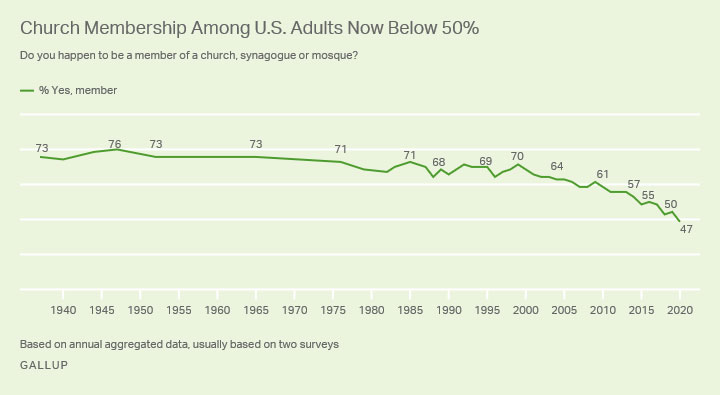For the first time in over 80 years of surveys on the subject, new Gallup data analysis released March 29 found that just 47% of American adults said they belonged to a church, synagogue or mosque in 2020—the first time that fewer than half of respondents reported membership at such houses of worship.
Gallup has documented a decline for decades, with particularly steep drops apparent in recent years. When the analytics company first asked about church, synagogue or mosque membership in 1937, 73% of respondents said they belonged to one. (Gallup’s question does not explicitly include other faith centers, such as Buddhist, Sikh or Hindu temples or meeting houses.)
That percentage stayed around the same until the turn of the century; in 1999, 70% of U.S. adults still said they belonged to one of the three. But, based on annual aggregated data from two surveys Gallup asks each year, by the mid-2000s it had dropped to around 60% and by 2018 it was 50%.

“A big part of this story is generational differences,” says Mark Chaves, a sociologist of religion at Duke Divinity School and the author of American Religion: Contemporary Trends, explaining that studies have found that “each generation is a little less religious than the generation before.”
“It’s not like today’s young people are particularly unreligious,” he continues; Gallup’s latest findings are that 66% of adults born before 1946 say they belong to a church, while 58% of Baby Boomers, 50% of Generation X and just 36% of millennials said they belong to one. “Their parents were less religious than their grandparents… it’s a longer term generational replacement that’s driving these longer term trends.”
Gallup found that the decline in membership is “primarily a function of the increasing number of Americans who express no religious preference.” Between 1998 and 2000, an average of 8% of Americans say they did not identify with any religion, per the company’s biannual surveys of U.S. religious attitudes and practices, according to a three-year aggregate of Gallup’s survey data. Just twenty years later, between 2018 and 2020, that figure had risen to 21%.
But Gallup has also seen a decline in house of worship attendance among Americans who do identify with having a religious preference. Between 1998 and 2000, an average of 73% of Americans who identified as religious said they belonged to a church, synagogue or mosque. Between 2018 and 2020, an average of just 60% of religious Americans said the same.
Many places of worship across the U.S. have been closed for over a year as the country contended—and continues to contend—with the COVID-19 pandemic. But Chaves says he thinks it’s “too early to tell” if the pandemic has played a role in the decline in house of worship participation. Jennifer Herdt, a professor of Christian ethics at Yale Divinity School, adds that she’s heard stories of the pandemic bringing some people back towards worship, either because of the ease of a virtual service or the need for a support system and a sense of community.
Herdt adds that while the decline in particular religious affiliations could be viewed in some ways as younger people turning away from institutions, it could also suggest a greater openness towards other faiths and world views—and a curiosity towards others’ beliefs.
“I don’t think that’s necessarily a bad thing, even from the perspective of a religious person,” she continues. “That openness is what many of the world’s religions teach: that we should be caring and loving of all others regardless of their religious commitments.”
More Must-Reads from TIME
- Donald Trump Is TIME's 2024 Person of the Year
- TIME’s Top 10 Photos of 2024
- Why Gen Z Is Drinking Less
- The Best Movies About Cooking
- Why Is Anxiety Worse at Night?
- A Head-to-Toe Guide to Treating Dry Skin
- Why Street Cats Are Taking Over Urban Neighborhoods
- Column: Jimmy Carter’s Global Legacy Was Moral Clarity
Write to Madeleine Carlisle at madeleine.carlisle@time.com